PEACE ON EARTH?
I started this BookNotes during the 12 Days of Christmas. We had heard the Christmas carols, studied at our Wednesday night Bible study the texts about the birth of Christ but also the prayerful songs of Mary and Simeon. We pondered the fascinating part of the story that has international astronomers honoring Christ and the horror of the way some kings will even slaughter innocents when their power seems to be threatened. Each year we are struck by how much more is going on in this classic Bible story, much that is missed in the popular imagination, which is sometimes shaped as much by the holiday cheer of Norman Rockwell and Hallmark than the actual Biblical text. I was struck, as many of us are most years, by how the theme of peace is unavoidably present in Scripture, including the Christmas narratives. Maybe we all need, as the Brethren put it a few decades ago, a “new call to peacemaking.”
I have written before about Biblical themes of shalom, about the idols of military might (as it is often shown to be in Biblical stories), about the tragedies of war, and about Biblical nonviolence. It’s been a while, though, and — now, with Martin Luther King’s Biblically-shaped messages of the mandate for nonviolence and the redemptive power of love ringing in our years from the recent MKL tributes — I thought I’d offer a handful of books, mostly recently released, about Biblical peacemaking and related themes. We have many more than these but since these are relatively recent, we wanted to highlight them here, hoping that book clubs and study groups and Bible studies and think-tanks will take them up for conversation and edification. Agree or not, these are all very much worth knowing about. Please, check this out and spread the word.
I will first highlight a few recent ones about coping with conflicted relationships in our polarized culture (that is, robust books about civility and the like, which is the least we can ask for), a few mostly new ones about Biblical nonviolence, and a few more directly about anti-war ministry. And a couple about parenting for peace and justice.
As the US government continues to pour lethal aid all over the world and tensions rise from Eastern Europe to the Middle East, from Africa to the far East, we need to deepen our consideration of what the body of Christ might pray, think, and do. It is complicated, I admit. We hope these good books will help.
A FEW RECENT BOOKS ABOUT ROBUST CIVILITY & GRACIOUS PUBLIC VIRTUE
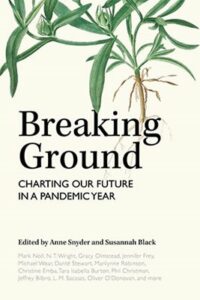 Breaking Ground: Charing Our Future in a Pandemic Year edited by Anne Snyder & Susannah Black (Plough Publishing) $35.00 OUR SALE PRICE = $28.00
Breaking Ground: Charing Our Future in a Pandemic Year edited by Anne Snyder & Susannah Black (Plough Publishing) $35.00 OUR SALE PRICE = $28.00
Every season or so a book comes out that is just so very special, brilliantly conceived, handsomely made, beautifully written, wisely argued, offer solace and joy, guidance and provocation, that as booksellers, we just want to celebrate its presence in the publishing world and the literary landscape, want to press it into the hands of nearly every thoughtful reader, and certainly want to write more about it than I should here at BookNotes. Breaking Ground is just such a book. I will refrain from saying too much, but want to alert you to its significance and invite you to consider it. It is an extraordinary volume, one you will keep and cherish for a lifetime.
Breaking Ground can be explained in several ways, from several angles, but I’ll just say this much: Anne Snyder and Susannah Black are two very different Christian women who individually edit our two favorite journals, magazines of class and intelligence, faith and vision, publications that we admire and support. Snyder is the editor of Comment (our friends Jamie Smith and Gideon Strauss were her predecessors, and I’ll admit I was honored that they allowed me to contribute to their magazine that was, in certain profound ways, in the lineage of Abraham Kuyper’s neo-Calvinist movement which we wrote out in the last BookNotes.) She has worked at think-tanks and in journalism, is a graduate of Wheaton College and is married to the well known pundit and public intellectual David Brooks. Comment is an artful, remarkable journal about reweaving our crumbling social architecture and provides some of the best writers about public life from within what we might call a broad and generous orthodoxy. They have published Smith, Seerveld, Mouw, of course, but also David Brooks and Mark Noll and N. T. Wright and Marilynne Robinson.
Susannah Black is also a remarkably gifted editor for another magazine, perhaps our favorite these days, Plough. From a different (more ecumenical and even interfaith) literary tradition and somewhat more unique perspective — it emerges from the Jesus-following, Anabaptist folks who live in intentional, shared community in places called The Bruderhof — Plough, like Comment, offers exceptionally high quality nonfiction writing about society, culture, faith, and values, enhanced by great photography and artwork. While Comment has roots in the Dutch Reformed community and Plough is grounded in the simple way of the Bruderhof, both have a knack for offering profoundly Christian insight into the issues of the day without seeming to be preachy. They are not churchy or overly theological. They include classic poetry and fine essays and astute social commentary (with Comment sometimes tending a bit socially conservative and Plough titling a bit leftward.)
When the pandemic got serious nearly two years ago, Snyder and her team at Comment (and their sister-in-arms Canadian think tank, Cardus) seeped their work which was already in progress about strengthening civic bonds, healing the fraying social fabric, explore the way the spirit of the age has deformed mediating structures and institutions. I do not recall if they ran pieces by Yuval Levin, but they might have. This project and the resulting book grew to become an online collaboration between Comment and Plough and enlisted all sorts of supportive organizations, such as the Center for Public Justice, the (&) Campaign, The Institute for Human Ecology at the Catholic University of America. It isn’t every day we see The Davenant Institute collaborating with The Awakening Project, and it is lovely to see The Trinity Forum listed next to Mosaic and Bitter Sweet. Kudos to educational organizations like the CCCU and Regent College and Fuller Theological Seminary and to policy think tanks like Initiative on Faith and Public Life for their role.
This kind of collaboration, they tell us, is “an expression of unity amidst plurality and respectful engagement in the context of diverse perspectives.” A lot of good stuff came out of that “web commons” and this book is the result of that “real time” writing offering insight about what we might do as we move forward past the worst years of the pandemic. Those who care about the common good and who long for fresh insights and daring but doable proposals, will find this book a major resource.
Here is what is on the back of the book to explain the genesis of the Breaking Ground project and eventual book:
A public health and economic crisis provoked by Covid-19. A social crisis cracked open by the filmed murder of George Floyd. A leadership crisis laid bare as the gravity of a global pandemic met a country suffocating in political polarization and idolatry. In the spring of 2020, Comment magazine created a publishing project to tap the resources of a Christian humanist tradition to respond collaboratively and imaginatively to these crises. Plough soon joined in the venture. So did seventeen other institutions. The web commons that resulted – Breaking Ground – became a one-of-a-kind space to probe society’s assumptions, interrogate our own hearts, and imagine what a better future might require. This volume, written in real time during a year that revealed the depths of our society’s fissures, provides a wealth of reflections and proposals on what should come after. It is an anthology of different lenses of faith seeking to understand how best we can serve the broader society and renew our civilization.
Wow. Authors contributing serious content to this nicely crafted thick hardback (of just over 450 pages) include Mark Noll, N.T. Wright, Grace Olmstead, Jennifer Frey, Michael Wear, Dante Stewart, Marilynne Robinson, Christine Emba, Tara Isabella Burton, Phil Christman, Jeffrey Bilbro, L. M. Sacasa, Oliver O’Donovan, Jake Meador, Cheri Harder, Amy Julia Becker, Jonathan Haidt, Gregory Thompson, Duke Kwon, Luke Bretherton,Doug Sikkema, Shadi Hamid, and more. They are a remarkable and astute group and this volume— arranged in four seasons — is a gift to behold.
Breaking Ground is surely one of the most important and beautiful books of 2022, a book to cherish. Thank you to all involved.
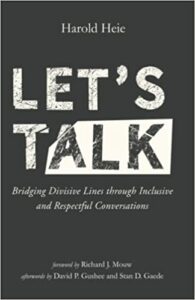 Let’s Talk: Bridging Divisive Lines Through Inclusive and Respectful Conversation Harold Heie (Cascade) $20.00 OUR SALE PRICE – $16.00
Let’s Talk: Bridging Divisive Lines Through Inclusive and Respectful Conversation Harold Heie (Cascade) $20.00 OUR SALE PRICE – $16.00
Speaking of collaboration and the broad Reformed tradition of Comment, and how Anne Snyder so wisely brought in a generous group of others unlike herself, inviting good faith conversation partners to find common ground and fresh expressions of our mutual concerns for public justice and the like, Harold Heie has been doing that his entire career. It is not an overstatement to say he has been an on-the-ground peacemaker and provocateur of communication across party lines for decades. He knows that the state of public discourse in America is dismal, “reflecting an extreme us-versus-them tribalism” but he knows that we can find what he calls “a better way.” And he has worked out avenues and structures to do that (before, and, now, during, Covid.)
Three quick things about this amazing little book.
First, Dr. Heie is not the sort of person who thinks that differences must be covered over or swept under the proverbial rug. He is about addressing in honorable ways the deepest differences among us and, informed by his own charitable Christian faith, learning to listen well. He says that learning to talk respectfully about the real differences among us is a deep expression of love for others so he is fairly aggressive in getting to the deeper sort of public civility and honest talk among parties with differences. Hold on.
Secondly (and this is related to the first point), Heie does not view the Godly call to be respectful and civil as mere examples of a bourgeois sort of etiquette. “Briding Divisive Lines” is hard work and while the stories in Let’s Talk are colorful, they are also sometimes painful. Further, let’s be clear: civility ought not be an excuse to fail to name serious injustices or harm. But we can work together to find certain areas of agreement and move forward in mutual initiatives for redemptive action. Although he is gentle and kind and a wise mediator/peacemaker, such virtues of “respectful conversation” does not stop him from speaking out against society’s evils or working hard to bring folks to some common ground.
Thirdly, Here has done this for years, quite practically, with face-to-face meetings, having organized small group forums and orchestrated convivial conversation sessions and convened working groups. I know that he has done this quite intentionally with some on-line sessions lately; I would not be surprised if some Hearts & Minds customers took him up on those invitations to participate. He’s been doing this for years; and he has learned some things (from, he is quick to say, his serious failures as well as the moderate successes.) This book is more than a technical manual or workbook, but it isn’t abstract theorizing either. He knows what he’s talking about, because he knows what he’s been doing, and, in a sense, Let’s Talk is nearly a memoir, a report from the field. It is very interesting and very inspiring.
To illustrate his long-standing work in this topic, just consider some of the titles he has written (and that we stock.) For instance, Learning to Listen, Ready to Talk: A Pilgrimage Toward Peacemaking (set mostly within Christian higher education inviting conversations among colleagues and stakeholders in some very contentious situations, by the way), Reforming American Politics: A Christian Perspective on Moving Past Conflict to Conversation (a thick volume, full of conversations, with a forward by his old friend Richard Mouw), Respectful LGBT Conversations: Seeking Truth, Giving Love, and Modeling Christian Unity (with a foreword by George Marsden) and, with Michael A. King, Mutual Treasure: Seeking Better Ways for Christians and Culture to Converse.
Let’s Talk is quite new and we are happy to commend it to you. We are not alone in expressing our admiration.
In a time of deep ideological and political polarization, churches have an opportunity and responsibility to model a different way, . . . not by forcing agreement but by inviting conversations that lead to deeper understanding and appreciation of our differences. Harold Heie seeks to give disciples of Jesus a path to reconciliation and renewal that is deeply needed by presenting concrete, practical advice for churches wishing to embark on this journey. — Elizabeth Brown Hardeman, pastor, American Reformed Church, Orange City, Iowa
In this revealing and compelling memoir, Heie demonstrates the many qualities that set him apart as a mature and exemplary follower of Jesus. For years, Heie has been calling us to what he calls ‘respectful conversations,’ marked by the biblical characteristics of ‘gentleness and respect.’ Those qualities, together with the author’s characteristic humility, make this a book worthy of serious consideration. — Randall Balmer, Dartmouth College, author of Bad Faith: Race and the Rise of the Religious Right
So many of us today are imprisoned by tribal politics . . . . That polarization has infected the church, sharply damaging our internal fellowship and our external witness. Heie offers us a liberating way out of our political and religious imprisonment. . . . Learning how to be both honestly rooted in our commitments and deeply open to listening and learning from the other is required for the church’s faithful future. — Wes Granberg-Michaelson, author of Future Faith: Ten Challenges Reshaping Christianity in the 21st Century
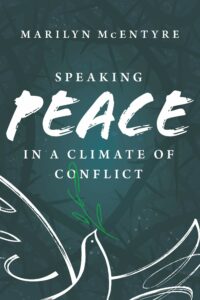 Speaking Peace in a Culture of Conflict Marilyn McEntyre (Eerdmans) $21.99 OUR SALE PRICE = $17.59
Speaking Peace in a Culture of Conflict Marilyn McEntyre (Eerdmans) $21.99 OUR SALE PRICE = $17.59
I reviewed this at BookNotes when it first came out last summer, but I love it so much, I’ll just reprise this review here. It certainly is a good one for our topic this week. Enjoy.
It is hard for me to do a talk on the power of books and the spirituality of the reading life without citing Marilyn’s nearly classic 2009 release, Caring for Words in a Culture of Lies (Eerdmans; $19.99) where she offers what she calls “stewardship strategies” to help us steward words well. It is a gem of a book, a little masterpiece and it reminds us that being careful about words can help us resist hype and spin and propaganda. More literary and offering more elegant joy than the rigorous (but also must-read) How to Think: A Survival Guide for a World at Odds by Alan Jacobs, say, Caring for Words is a book I highly recommend, often, to nurture the Christian mind.
And then, this summer, Eerdmans released what seems nearly to be a sequel to Caring for Words, namely, Speaking Peace in a Climate of Conflict and it is wondrous. This is not your typical book about civility — I will name a few of those momentarily — as it really isn’t only about peacemaking or reconciliation efforts. Some of the chapters are fairly directly about that (“Quit Trying to Win” for instance) but there are other themes developed in chapters with captivating titles such as “Unmask Euphemisms”, “Embrace Your Allusive Impulse”, “Complicate Matters”, “Remind People of What they Know.” In a way, it is about “speaking the truth in love” as the Bible says, nearly a handbook for speaking up well.
Indeed, there is a chapter called “Articulate Your Outrage” and another called “Find Facts and Check Them” and, then, one called “Laugh When You Can.” It almost sounds like it is for those of us who do get in heated conversations a lot, or who feel they should. (At moments, it made me think of the very helpful Raise Your Voice: Why We Stay Silent and How to Speak Up by Kathy Khang.) Still, it is artful and literary and so enjoyable for anyone who loves good writing. Poets among us will love her reflection on “telling it slant” and will cheer for the chapter, “Promote Poetry.” Speaking Peace… is a bit more feisty than some books about resisting conflict with civility and even a bit more passionate about public life than what was already heavy Caring for Words… Speaking Peace is a book we need, now, now more than ever. Marilyn McIntyre is a model and wise guide, an ally.
And here is one thing that is fabulous: McEntyre does all this by drawing on exemplary authors, writers she likes, lines she loves, books and essays and poems that have given her endurance and voice, that serve as models for what we are talking about here.
Who wouldn’t want to know which great writers are considered commendable by somebody as expert as lit prof Ms McEntyre? Who couldn’t benefit by having her tell you who to read and why? For lovers of words, book lovers, those who care about reading wisely, this book is a gem. But more, it is equipping us all to the vocation of using words well for the common good.
We have quoted this wonderful back cover blurb by Leslie Leyland Fields before, and I’ll share it here, again, hoping it inspires you to want to sit under the tutelage of this wonderful little book. I need it. Do you?
It’s commonplace to lament the loss of civil discourse, but few do anything about it. For years, Marilyn McEntyre has been quietly shepherding us toward God’s intention of language as a gift rather than a weapon. She’s done it again. We need her brilliantly crafted words more than ever to show us again how to speak, live, and act in accord with the beautiful gospel. — Leslie Leyland Fields author of Your Story Matters: Finding, Writing, and Living the Truth of Your Life
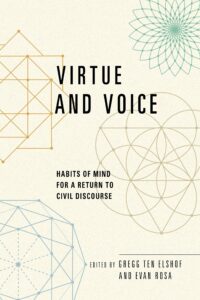 Virtue and Voice: Habits of Mind for a Return to Civil Discourse edited by Gregg Ten Elshof & Evan Rosa (Abilene Christian University Press) $24.99 OUR SALE PRICE = $19.99
Virtue and Voice: Habits of Mind for a Return to Civil Discourse edited by Gregg Ten Elshof & Evan Rosa (Abilene Christian University Press) $24.99 OUR SALE PRICE = $19.99
Here is another that I reviewed in that post of November 2021, a set of suggestions about the post-election tensions. (I had no idea what would be unfolding, of course, but I still stand by the recommendations.) This book is extraordinary, so wanted to list it here.
Oh my, just when I thought there were enough books on civility there is this. Wow. I’ve often said one hardly needs more than Richard Mouw’s splendid Uncommon Decency: Christian Civility in an Uncivil World (IVP; $20.00; our sale price at 20% off makes it $16.00.) I still think that Mouw is indispensable for anyone wanting to grow in convicted civility. It makes a great reading group study.
Virtue and Voice, though, is simply amazing, a major contribution, one of the most important books in this genre that has come out in years. It is a collected anthology of rather academic work by authors with a variety of angles of vision — they are ethicists, philosophers, historians, theologians and thought leaders of various sorts. Many of these (including the aforementioned Rich Mouw) have spent long years working on this topic and speak from both personal and professional experience and expertise.
The editors themselves are remarkable and remarkably astute in curating this volume for us. Gregg Ten Elshof wrote the fabulous, little I Told Me So: Self Deception and the Christian Life (not to mention a good book on Confucius for Christians.) Mr. Rosa is the assistant director of public engagement at the Yale Center for Faith and Culture where he works with Miroslov Volf. Very impressive, huh?
The pieces here acknowledge that the current climate of contentious and ineffective civil discourse is troublesome but they also show how “the cultivation of intellectual virtues can renew our voices and heal the broken state of our public discourse.”
I am not sure that academics in a rare volume like this — vital and beautiful as it is — can heal the culture at large. But this is what philosophers and thought leaders do at their best; they become public intellectuals and use their scholarly chops to help us dig deeper and learn some important stuff. It is a gift, a tool, a resource to help us think and cultivate some deeper approaches.
The important stuff on offer here is a deeper way to think about civility by linking it to virtue and, then, to this notion of intellectual virtue, drawing on Augustine’s notion of “rightly ordered affections.” Some who have heard me lecture on the formation of the Christian mind may recall (okay, it’s a long shot, but you might) that I love a book called Virtuous Minds: Intellectual Character Development written by Philip Dow (IVP; $20.00.) This new recent one, Virtue and Voice moves that notion further along in a very generative way. Our intellectualism has to be virtuous (shaped by traits such as honesty, curiosity, humility) and, here, these virtues must shape our public voices. Can we be public intellectuals that invite humility? Can intellectuals who speak out to influence the day also be marked by respect? Can we use our strong ideas in a way that invites people to a hospitable conversation?
The authors here range from Robert Audi to Christena Cleveland, from George Marsden (who here writes on C.S. Lewis) to Robert Roberts. There are people of various specialities, men and women, from evangelical Christian colleges and universities (Biola, Grove City College) and Roman Catholic institutions (Notre Dame, Loyola at Marymount) and from secular state university settings. You’ve got to see Linda Zagzebski’s (of the University of Oklahoma) reflecting on “intellectual virtue terms” and linguistics and semantics.
I think I liked Christina Cleveland’s piece the best, but these hefty, intellectual essays are all astute and often inspiring. How we cultivate intellectual virtues both in the academy and the wider culture is an urgent question which should capture some of our BookNotes readers. We recommend Virtues and Voices: Habits of Mind for a Return to Civil Discourse and celebrate its contribution to the ongoing maturity of our witness.
Listen to the ever-wise, virtuous Lutheran leader and church historian and public journalist Martin Marty, who wrote a lengthy review. He notes,
Every day, hour, and minute, our personal experiences and the media demonstrate the incivility of public discourse in moral, political, and religious life. Not content merely to report on the public scene, these essays demonstrate the value of curiosity, attentiveness, open-mindedness, intellectual carefulness, and intellectual thoroughness… Civil discourse can make a refreshing difference. Virtue and Voice creatively dedicates itself to such discourse, and readers of this book who put any of its contributions to work in the larger society will find fresh ways to be intellectually virtuous.
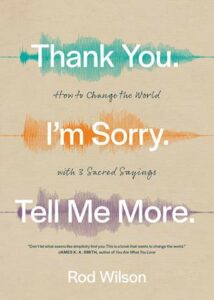 Thank You. I’m Sorry. Tell Me More. How to Change the World with 3 Sacred Sayings Rod Wilson (NavPress) $12.99 OUR SALE PRICE $10.39
Thank You. I’m Sorry. Tell Me More. How to Change the World with 3 Sacred Sayings Rod Wilson (NavPress) $12.99 OUR SALE PRICE $10.39
This is a compact sized paperback that is not that long. It is upbeat, looks nice. Yet, it is wise beyond its simple-sounding appeal. As Jamie Smith says, “Don’t let what seems like simplicity fool you. This is a book that wants to change the world.”
Yes, the chapters are short, but they are luminous, beautifully written, clear yet profound. The author takes these three often misunderstood phrases and unpacks them, helps us grasp them, invites us to new habits and new hopes. The stories Wilson (who is a psychologist, has served as a pastor and as former President of Regent College in Vancouver) tells are moving and model for us what it means to be prepared to offer goodness in our relationships.
As the book reminds us, when we say, “Thank you,” we acknowledge the way others impact us. When we say, “I’m sorry,” we acknowledge the way we impact others. When we say, “Tell me more,” we acknowledge the way we impact each other.
This gracious book is really something. Great writers of empathy and depth rave — Dan Allender, Luci Shaw, Alia Eyres, Patricia Towler and more. Listen to this:
Sometimes we have to talk ourselves into becoming different people. We believe what we repeat. We live into what we rehearse. In this wise and inviting book Rod Wilson offers us three simple but potent litanies that could talk us into becoming a society that is attentive, caring, vulnerable, and grateful. Don’t let what seems like simplicity fool you. This is a book that wants to change the world. It starts with me. And you. — James K.A. Smith, author of You Are What You Love and On the Road with Saint Augustine
From a neat note about the cover design that they nicely offer: “The cover design for Thank You. I’m Sorry. Tell Me More. is meant to demonstrate the important distinction for the book. The graphics behind the text of the cover are the sonic patterns made when we speak these words. The pattern behind the phrase is what the phrase sounds like. They are sacred sounds because they have such transformational quality, because they reflect the character of God.”
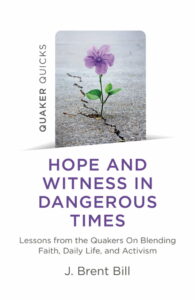 Hope and Witness in Dangerous Times: Lessons from the Quakers on Blending Faith, Daily Life, and Activism J. Brent Bill (Christian Alternative) $10.95 OUR SALE PRICE = $8.76
Hope and Witness in Dangerous Times: Lessons from the Quakers on Blending Faith, Daily Life, and Activism J. Brent Bill (Christian Alternative) $10.95 OUR SALE PRICE = $8.76
This book is short, slim, fun, interesting, and, for somebody like me who is not a Quaker, very informative and helpful. For someone who has read a bit about the blending of a contemplative sort of spirituality and a journey outward towards public engagement and a bit of social activism, this, truly, is a delight. Quakers were sometimes called “angelic troublemakers” and this is a great invitation to learn about their serenity and hope. Even if they are pretty quiet about it.
I love this author — we’ve carried more substantive books of his over the years (most recently, a lovely Paraclete title Beauty, Truth, Life, and Love: Four Essentials for the Abundant Life.) He has written about spiritual discernment (Sacred Compass) about the spirituality of wonder in everyday life (Awaken Your Senses) and one called Holy Silence. And who can forget his hilarious Life Lessons from a Bad Quaker?
This little book, which is only 70 pages if you count the footnotes, is not exactly about peacemaking or even about conflict and civility in our polarized culture. But, yet. Yes, it sort of is. He tells us a bit about the Friends movement and he invites us to humble faith practices that just might help us provide some sort of fresh relationship with the world around us. He calls us to an activism that is rooted in a deep spirituality and a prophetic witness that is bold, but always respectful. As one chapter puts it, we can be involved in “Doing Good While Being Good.” He says, bluntly at one point, that genuinely spiritual activism “must go beyond partisanship.” Right on.
He quotes his friend singer/songwriter (and Quaker) Carrie Newcomer from time to time. I hope you know the song that goes like this:
The shadows of this world will say / There’s no hope, why try anyway?
But every kindness large or slight / Shifts the balance toward the light.
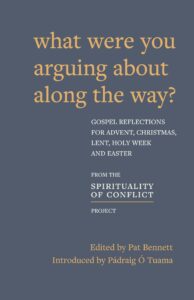 What Were You Arguing About Along the Way? Gospel Reflections for Advent, Christmas, Lent, Holy Week, and Easter edited by Pat Bennett, introduced by Padraig O’Tuama (Canterbury Press) $27.99 OUR SALE PRICE = $22.39
What Were You Arguing About Along the Way? Gospel Reflections for Advent, Christmas, Lent, Holy Week, and Easter edited by Pat Bennett, introduced by Padraig O’Tuama (Canterbury Press) $27.99 OUR SALE PRICE = $22.39
This is an excellent resource for preaching, pastoral care and personal formation, I think, emerging as it does from the Spirituality of Conflict Project created by Padraig O’Tuama (who has written many of the reflections.) This is a lectionary resource with an introduction for the gospel of the day, a commentary and reflection, some suggestions of ways to respond to the text and teaching, and a closing prayer. Nice.
What is so very unique about this collection of dozens of entries is that they are Bible based but the authors all draw on the work in reconciliation in places like Corrymeela, Iona, Place for Hope, Coventry Cathedral, Holy Island and other local church and community contexts. They are both Catholic and Protestant. The royalties from the sales of the book will support Corrymeela’s Public Theology Project.
Pat Bennett, by the way, is a writer and liturgist with a background in science and theology and is a member of the Iona Community. Padraig O’Tuama, as I hope you know, is a poet, writer, speaker and broadcaster (who curates and presents “Poetry Unbound” podcast from the On Being studios. He has been a leader in the peacemaking community, Corrymeela in Northern Ireland.
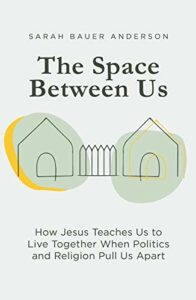 The Space Between Us: How Jesus Teaches Us to Live Together When Politics and Religion Pulls Us Apart Sarah Bauer Anderson (Sarah Bauer Anderson) $15.99 OUR SALE PRICE = $12.79
The Space Between Us: How Jesus Teaches Us to Live Together When Politics and Religion Pulls Us Apart Sarah Bauer Anderson (Sarah Bauer Anderson) $15.99 OUR SALE PRICE = $12.79
I could name a handful of other good books along these lines —most obviously the classic Uncommon Decency by Richard Mouw, but also, say, Them: Why We Hate Each Other – And How to Heal by Ben Sasse or Reforming American Politics: A Christian Perspective on Moving Past Conflict to Conversation by the aforementioned Harold Heie I wrote about a few others at a BookNotes two years ago. But this very recent one, self published so not terribly well known, is a little gem, a quiet treasure, an amazing piece of work.
Bauer Anderson, we learn, was raised as part of the severe Christian Right; her dad is an immediately recognizable name in those circles having worked for the Reagan administration and founded the Family Research Council. She is a native of the greater DC area (although, as she puts it now, she is a resident of the Bible Belt and has great disagreements with own family.) She has “spent my entire life learning to navigate the complicated and emotional conversations around politics and religion.” She wrote this recent book out of her own experience so folks can become part of the solution to our polarized and conflicted times, knowing a bit about how tension and heat in personal relationships can be, as she puts it, “discouraging, disheartening, disappointing.”
I really, really respected the fiesty Danielle Strickland, an activist and justice advocate and author, who says of Ms Bauer Anderson,
Sarah is a fresh and passionate voice for holy disruption and faith. Both challenging and engaging!
Andy Stanley writes,
This is a timely and necessary book. Sarah shows us that, once again, following Jesus is our best hope for navigating the most complex issues in culture.
The Space Between Us is a handy trim sized paperback, 250 pages, with 14 creative and interesting chapters. It ought to be better known and we’re happy to recommend it.
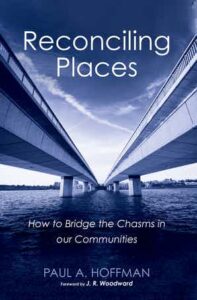 Reconciling Places: How to Bridge the Chasms in Our Communities Paul A. Hoffman (Cascade Books) $20.00 OUR SALE PRICE = $18.00
Reconciling Places: How to Bridge the Chasms in Our Communities Paul A. Hoffman (Cascade Books) $20.00 OUR SALE PRICE = $18.00
This is a rare and unique book and for those seriously studying local peacemaking in these polarizing times, it is very, very useful. Hoffman (who has a PhD form the University of Manchester) has been a pastor of a large Evangelical Friends Church in Newport, CA and has served as an oversight leader in the Evangelical Friends movement. It seems he is a truly tested, bridge-building person himself and has years of experience of bringing together alienated (and even hostile) communities. This book is the fruit of years of conflict mediation, bridge-building, peace-forming efforts and offers big picture theory and down-and-dirty, very practical guidance in our efforts to work Christianly towards reconciliation in real places.
Missional thinker and author J.R. Woodward wrote a very good foreword about not only how much he admires Hoffman’s integrity and passion for reconciliation, but for his deeply theological and spiritual insights about our polarization and what it might take to find some common ground among distanced parties. Hoffman has worked in urban, cross-cultural settings, to be sure, but these principles gleaned from this reconciling work, can be applied in various territories and spaces.
Reconciling Places allows us to cultivate a “sense of place” and a theology of geography, so to speak, but also allows us to know why and how to build bridges. This is a remarkable handbook, thoughtful and inspiring. There are good discussion questions and “next steps” suggestions.
RECENT BOOKS ABOUT BIBLICAL PEACEMAKING & CHRISTIAN NONVIOLENCE
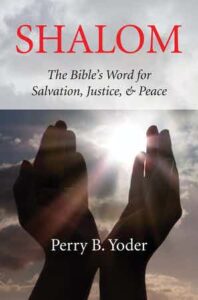 Shalom: The Bible’s Word for Salvation, Justice, & Peace Perry Yoder (Wipf & Stock) $20.00 OUR SALE PRICE = $18.00
Shalom: The Bible’s Word for Salvation, Justice, & Peace Perry Yoder (Wipf & Stock) $20.00 OUR SALE PRICE = $18.00
This is not new but is a fairly recent reprint of an older classic, once published by the Evangel Publishing House. He is an Old Testament professor at Associated Biblical Mennonite Seminary in Elkhart, Indiana, and has written widely on Biblical interpretation, hermeneutics, having done years ago a little book on how to lead small group Bible studies. He knows the Word and he knows the words of the Word. And, here, it pays off as he explores the meaning of that rich, rich, world shalom.
I don’t think I know another book like this — ten solid, meaty, but quite readable chapters on shalom in the Old and New Testaments. Just 146 pages. Indispensable.
 Speak Your Peace: What the Bible Says About Loving Our Enemies Ronald J. Sider (Herald Press) $16.99 OUR SALE PRICE = $13.59
Speak Your Peace: What the Bible Says About Loving Our Enemies Ronald J. Sider (Herald Press) $16.99 OUR SALE PRICE = $13.59
You may have heard me say that one of the very important books in my journey to understand Biblical peacemaking was Sider’s 1975 book Christ and Violence. It was the first book I ever got paid to review, a couple of dollars for a couple of paragraphs in Sojourners.) It remains a little work that I revisit from time to time. As an impeccable evangelical with utter regard for the authority of Scripture, Ron — in the nonviolent Anabaptist tradition — has written several other books about peacemaking. One of his magnum opus works was the 2019 If Jesus Is Lord: Loving Enemies in an Age of Violence and this recent shorter one is an abridged version of that. That was a major and somewhat scholarly work with lots of footnotes about ancient sources and detailed exegetical studies. This one has eliminated some of the scholarly apparatus, cut down on the footnotes, slimmed down the argument. It isn’t a bare-bones study, but it is brief and full of stories and inspiring messages and calls us to Biblical obedience on the call to nonviolence. He tackles questions not only about whether the Bible in its fullness teaches peacemaking, but if nonviolence is naive or perhaps even irresponsible.
(Ron did his own PhD work at Yale on Luther and knows a bit about mainline and of course evangelical theology and he shared an office for a few years with a intellectually strong and firmly Calvinist in the just war tradition — who was a Marine, no less! So he isn’t unaware of the conversations about these things and criticisms Biblical pacifists sometimes endure.)
Blurbs on the back of this small but potent volume are by Stanley Hauerwas and Walter Brueggemann, Kathy Khang, Bruxy Cavey, Sami Awad, Jer Swigart; although it is not in this edition, Richard Mouw (who is not a pacifist so disagrees with some of Ron’s views and conclusions) wrote a fabulous forward to If Jesus Is Lord commending it as a major work with which we should be familiar.
The cover is a bit cute and linked to the goofy peace sign some of us old hippies still flash. I wish the design carried a bit more weight and gravitas — perhaps they were trying to note that it is readable and not dry. Fair enough; there are good discussion questions, too, making this ideal for a small group book club, an adult Sunday school class, or any Christian ed forum willing to grapple with the Bible and its serious implications. I’ve raved about this before, as I do all of Ron’s inspiring books. I really hope you consider it.
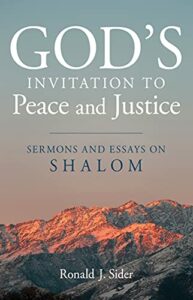 God’s Invitation to Peace and Justice: Sermons and Essays on Shalom Ronald J. Sider (Judson Press) $19.99 OUR SALE PRICE = $15.99
God’s Invitation to Peace and Justice: Sermons and Essays on Shalom Ronald J. Sider (Judson Press) $19.99 OUR SALE PRICE = $15.99
Well, Sider has not only published books about peace, justice, world hunger, local poverty, the early church, evangelism, discipleship, being consistently pro-life, and how to think consistently in a Biblical way about political policy, he has been tireless in speaking, teaching, leading workshops, doing seminars, even helping Richard Foster with prayer retreats and Sojourners with on-the-streets protests. He didn’t have the flamboyance of his friend Tony Campolo and yet spoke endlessly and ecumenically, almost as often as Tony has. (And both men — praise to the Lord! — are recovering well from serious health problems and major hospitalizations a year ago.)
Here we have an excellent collection of some of Ron’s singular essays, talks, and sermons. At 238 pages you get a lot of content, good words about important topics.
One of the things I am enjoying about this anthology is to read Ron’s own summary of the presentation — when he delivered it and why, and, in some cases, some of what he thinks now about it all. Man, he got around, and, wow, did he bring strong truth in a variety of ways.
Last week I mentioned the book about applying the big vision of Abraham Kuyper’s Princeton “Stone Lectures” to all of life. God’s world is a good creation, now in sin and rebellion, being straightened out, healed, transformed, as Christ’s Kingdom comes to every square inch under the Kingship of Christ. Sider believes all that and while growing up as a Mennonite and Brethren farm boy he brings a somewhat different tact to the application of whole-life discipleship, he gets the contours of that Kuyperian vision as well as anyone, I’d say. Here he is rooted in Scripture, alive in faith, empowered by the Spirit, and hopeful about the possibilities of God’s people finding the grace to deepen both personal holiness and public faithfulness. The 18 chapters in God’s Invitation to Peace and Justice are great bread for the journey, inspiring words and keen insight about moving into a wholistic and multi-faceted Kingdom vision. Highly recommended.
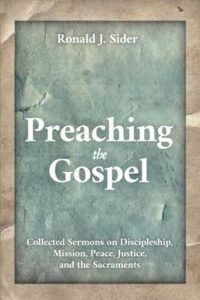 Preaching the Gospel: Collected Sermons on Discipleship, Mission, Peace, Justice, and the Sacraments Ronald J. Sider (Cascade Books) $20.00 OUR SALE PRICE = $18.00
Preaching the Gospel: Collected Sermons on Discipleship, Mission, Peace, Justice, and the Sacraments Ronald J. Sider (Cascade Books) $20.00 OUR SALE PRICE = $18.00
This was a surprise a few months ago when this indie publisher released this great collection of various Sider sermons on various topics. I’ve always been a fan (as you can tell from my above comments) of Ron’s balanced faith, his evangelical credentials, his broad understanding of church history, theology, and contemporary political and economic social concerns. Mostly, though, he wants to be known as a Bible-based preacher and honest follower of his Lord and Savor, Jesus Christ. In these sermons, talks, messages, and speeches, it comes through, over and over. He has spoken all over the world and his devotion to Jesus and his well-grounded roots in the Scriptures has shaped his message without compromise.
And how touching some of these are! The first chapter is one I have read elsewhere, a beautiful and inspiring sermon preached at his father’s funeral in 2004 in Ontario. His famous “Words and Deeds” message (about the importance of both social justice and evangelism — themes of which he spoke with equal vigor at the World Council of Churches and at the National Association of Evangelicals) that he delivered in South Africa in 1979 is here, and as timely as ever. His often preached “If Christ Be Lord” sermon was first delivered at a Presbyterian Church in Bethlehem, PA, in 1978 — I have a friend who was there to hear it. I moved me as I read it again last week.
I am obviously not alone in my admiration for Ron’s passion and faith. Read these two endorsements carefully, and pray if God might inspire you to read these messages and take up his call and challenge.
For nearly five decades I’ve been privileged to witness Ron Sider’s groundbreaking work as a leading evangelical voice for the imperatives of social justice. His earned reputation is as a compelling Christian author and energetic social activist. But I welcome the publication of Preaching the Gospel because we see the whole of Ron’s ministry and commitment. These sermons and lectures reflect on marriage and holiness, as well as apartheid and violence. He ponders baptism and communion, as well as justice and peacemaking. This book is a treasure of Ron Sider’s pastoral and prophetic wisdom, held together holistically, just as he has lived. It’s a gift to all who have been inspired by his faithful witness. — Wesley Granberg-Michaelson, author of Without Oars: Casting Off into a Life of Pilgrimage and General Secretary Emeritus, Reformed Church in America
I have heard Ron Sider preach over the past forty-five years. His sermons and prophetic speeches were a fountain of ‘understanding the times,’ anointed by the Holy Spirit, wrapped in a biblical and historical foundation that flowed like a river to one’s soul. What an incredible gift to now have these sermons and prophetic speeches available for these days and new generations to come. They are ageless. — Jo Anne Lyon, General Superintendent Emerita of the Wesleyan Church
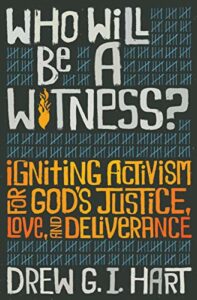 Who Will Be a Witness? Igniting Activism for God’s Justice, Love, and Deliverance Drew G.I. Hart (Herald Press) $18.99 OUR SALE PRICE = $15.19
Who Will Be a Witness? Igniting Activism for God’s Justice, Love, and Deliverance Drew G.I. Hart (Herald Press) $18.99 OUR SALE PRICE = $15.19
Many of us who embrace Biblical nonviolence and robust Christian resistance to the violent hurts of our culture have learned much (or have tried to learn) from Martin Luther King, Jr. (His nonviolent training done in Birmingham outlined in his first book Stride Toward Freedom — and explored for contemporary relevance in so many books such as Healing Resistance: A Radically Different Response to Harm by Kazu Haga — remains foundational. His Riverside anti-war speech one year before his assassination, again, remains foundation.) There are many black leaders of recent years, including some who are fairly young, to whom we should now look for insight about nonviolent peacemaking in the context of systemic social injustice. They understand in their bones better than many of us. One such leader to whom we now look is central Pennsylvania’s own Dr. Drew Hart. He is a public intellectual, an activist theologian, a popular professor at Messiah College (with a PhD from the Lutheran Seminary in Philadelphia.) He knows his stuff, and we’ve highlighted this book (and his first, The Trouble I’ve Seen) over and over. I name this most recent one here, gladly, in part because he situates Biblical reconciliation within the bigger context of social injustice and he places Jesus’s own rather revolutionary nonviolence in contrast with Barabbas. Indeed, I’ve read and re-read the chapter “Liberating Barabbas: And the Things That Make for Peace” several times and for our purposes here in this BookNotes, it is, truly, worth the price of the book.
Listen to Rich Villados, pastor of New Life Fellowship in Queens and author of The Deeply Formed Life:
Drew Hart offers us a powerful vision to be a people on the liberating journey. I’m inspired by his depth of insight, social and spiritual analysis, and the demanding — yet accessible — ways he names for living faithfully to God. I highly recommend this book!
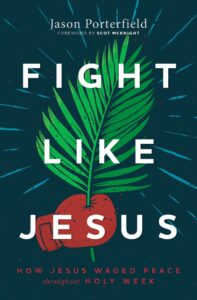 Fight Like Jesus: How Jesus Waged Peace Throughout Holy Week Jason Porterfield (Herald Press) $17.99 OUR SALE PRICE = $14.39
Fight Like Jesus: How Jesus Waged Peace Throughout Holy Week Jason Porterfield (Herald Press) $17.99 OUR SALE PRICE = $14.39
This is one of the books that I’ve most looked forward to — we hadn’t gotten an advanced manuscript or anything, but we had heard it was to be released in February and it just arrived. I’m so glad we can tell you about it and I think it is going to be very highly regarded and quite useful for many folks, especially in this upcoming Lenten season.
Porterfield has lived all over the world (having worked in Asia with the respected Servants, an international development group that serves the poorest of the poor) and has often found himself on the margins of society, living among the neglected and hurting. This gives him huge credibility as he has nurtured not only a deep and compassionate faith but has seen how the powers of the world work, No one can accuse him of being naive.
One of the great features of Fight Like Jesus is that it uses as its starting point and foundation the tragic passage in the gospels when Jesus weeps over Jerusalem, (Jeri-shalom, of course, means “the city of peace”) because it does not know the ways of peace. Jesus’s own lament and heartbreak and declaration should mean much to us, I’ve always thought — what a stinging rebuke, but offered through tears. If Jesus wants His people to know the ways of peace, we certainly should listen up, read up, study up, do what we can to become the sorts of people over whom Christ does not shed similar tears. Right?
So. Porterfield starts us off with a teaching that many of us have used, most of us have heard, but that has rarely been explored with such helpful detail, and that is with Jesus’s entry into Jerusalem on Palm Sunday. Oh my, this is good and helpful stuff.
Naturally, we all know, a real king (or at least the sort they’d always expected) wouldn’t coming riding a lowly donkey but a war-horse, a mighty steed. Oh my, this itself if rich and provocative and Porterfield unpacks the implicit theology of this, linking the non-violent kingly manner of Jesus with many Older Testament prophecies. For those with eyes to see, this should have been a confirmation, not a confusion. But yet, today, year after year, we seem to be confused, missing the point of this dramatic enactment of nonviolent resistance.
As it says on the back, “Throughout holy week, two competing approaches to peacemaking collide.” And, it asks, provocatively, “what if we’ve embraced the wrong one?”
Scott Bessenecker, national director of global engagement and justice for InterVarsity Christian Fellowship writes, “We need now, more than ever, Porterfield’s call for Christians to embrace our heritage as forgers of peace in a world of division.”
Fight Like Jesus is a deep dive into this one week in the life of Jesus — and what a story it is. I suspect you’ve never before reflected on some of these implications Porterfield draws from Holy Week — I’ve tried to be attentive to this very thing before, and am eager to learn so much new by reading this new volume. I hope you are as excited as I am. As the author notes, “we need to be trained in Jesus’s way of making peace. The good news is, if you want to learn how Jesus makes peace, there is no better place to look than Holy Week.”
Here are a couple of great endorsements from folks we admire and trust:
Porterfield’s life and his book converge in these pages as a witness to the kind of peace we all need. I know I do, and I pray you will put this book in your book bag or back pocket or on your reading stand and read it each day of Holy Week. — Scott McKnight, author of A Church Called Tov: Forming a Goodness Culture That Resists Abuses of Power and Promotes Healing and The King Jesus Gospel
For those who think ‘peace’ might be mild or meek, flimsy or weak, Jason Porterfield unpacks Jesus’ embrace of a radical peace. Built on a faithful biblical exposition, this book inspires and equips today’s courageous peacemakers to fight like Jesus. Will you put down your hammer and join Him? — Margot Starbuck, author of Small Things with Great Love: Adventures in Loving Your Neighbor
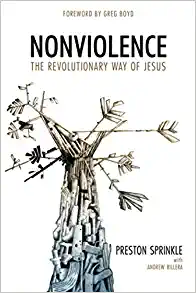 Nonviolence: The Revolutionary Way of Jesus Preston Sprinkle (David C. Cook) $17.99 OUR SALE PRICE = $14.39
Nonviolence: The Revolutionary Way of Jesus Preston Sprinkle (David C. Cook) $17.99 OUR SALE PRICE = $14.39
This book just came out although it is mostly a title change and slightly new cover of a previous book called Fight: A Christian Case for Nonviolence. That one (2013) had a forward by Shane Claiborne; the new edition as a forward by Greg Boyd. Still, with some help for co-author Andrew Roller, Sprinkle here brings his evangelical piety and fervor to this question of Biblical nonviolence.
It is fascinating to me — Sprinkle is a standard evangelical on most matters. He has a lively and helpful book on grace in the Old Testament; he has one defending conventional views of hell; while he wants to be generous and gracious and inclusive he holds to the older school view of traditional opposition to full acceptance of LGTBQ people in the church. He is upbeat and energetic and thoughtful and a pretty typical example of a moderate, well-spoken, non-denominational evangelical leader. And then he announced he had become convinced of Biblical pacifism, based on his study of the Old and New Testament (and early church history.) And then was published by an iconic, evangelical publishing house with a blurb by Francis Chan. I didn’t see that coming.
I enjoyed this book immensely and it gave me good hope that when people are honest about the Scriptures and eager to live into the trajectory of the good news of Christ, they can change their minds about things and come up with surprising and fresh new insights. Sprinkle is not a Mennonite or Quaker or otherwise part of an official pacifist denomination, so his take is a bit different and his interaction with Scripture is robust and interesting. I was very glad for the older edition (we still have some of the one called Fight at $14.99) and even more glad for this new one with a better, clearer title. Agree or not, this is a fine book to consider, especially if you are part of the mainstream, evangelical world.
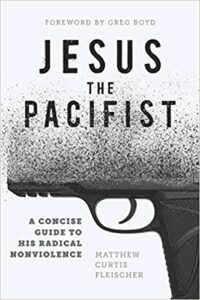 Jesus the Pacifist: A Concise Guide to His Radical Nonviolence Matthew Curtis Fleischer (Epic Octavius the Triumphant) $12.99 OUR SALE PRICE = $10.39
Jesus the Pacifist: A Concise Guide to His Radical Nonviolence Matthew Curtis Fleischer (Epic Octavius the Triumphant) $12.99 OUR SALE PRICE = $10.39
Want a basic, slim, solid, Biblical basis for how Jesus taught a consistent turn-the-other-cheek sort of active nonviolence? Want one of the best short summaries of Christ-like peacemaking? This is it. It’s fairly new, and new to me.
Greg Boyd says in his preface that it is “Easy-to-read and compellingly argued… masterfully demonstrated … a treasure trove of insights.”
List to these other reviews:
Fleischer makes a compelling case: Nonviolent peacemaking is the indisputable way of Jesus. The core of the gospel. The very heart of God. Jesus the Pacifist dispels any doubt about these truths. — Donald B. Kraybill, author of The Upside-Down Kingdom
Walter Wink once said that non-violence is at “the essence of the gospel” such that Jesus followers “should not be called pacifists, but simply Christians.” Matthew Curtis Fleischer knows this, and herein he systematically, cogently, and pointedly makes just such a case. It is a welcome and well-researched volume, and I hope many people grapple with, argue about, and are convinced by Fleischer’s contentions. — Lee C. Camp, author of Scandalous Witness: A Little Political Manifesto for Christians
I’ve only skimmed but am now eager to read an earlier book Fleisher did, which we have: The Old Testament Case for Nonviolence (Epic Octavius the Triumphant) $12.99; OUR SALE PRICE = $10.39.)
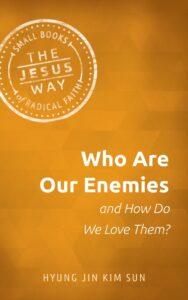 Who Are Our Enemies and How Do We Love Them? Hyung Jim Kim Sun (Herald Press) $12.99 OUR SALE PRICE = $10.39
Who Are Our Enemies and How Do We Love Them? Hyung Jim Kim Sun (Herald Press) $12.99 OUR SALE PRICE = $10.39
This is the shortest little book on our list and it is very good. I like this whole series of “The Jesus Way” books which are described as “Small Books of Radical Faith.” There are about a dozen of these, including Who Was Jesus and What Does It Mean to Follow Him?, What Is the Kingdom and What Does Citizenship Look Like?, What Is the Church and Why Does It Exit?, What Is God’s Mission in the World and How Do We Join It?, What Does Justice Look Like and Why Does God Care About It? and more. Each is about 80 pages and has good discussion questions. Kudos to Herald Press, a publishing house of the Mennonite church for doing such fabulous little resources.
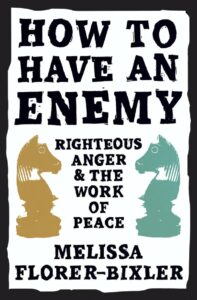 How to Have An Enemy: Righteous Anger & the Work of Peace Melissa Florer-Bixler (Herald Press) $16.99 OUR SALE PRICE = $13.59
How to Have An Enemy: Righteous Anger & the Work of Peace Melissa Florer-Bixler (Herald Press) $16.99 OUR SALE PRICE = $13.59
When I was describing this during a Zoom call a while back for a small group wanting some ideas for their next book club, I heard a gasp when I mentioned this. These are folks who were, I think, mostly quite aware of the gospel call to action, to service, and to peacemaking.They differed politically, I suspect, but they shared common values about wanting to make the world better and to bring God’s light into hard places. And so, regardless of their venue for doing that, no matter the area of need they most cared about, indeed, no matter where they stood on a political spectrum, they all cared deeply, they all knew things were messed out there, and, I gather, they all carried their hurts just below the surface. Maybe you, too, are often on the verge of having concern give way to anger, of frustration giving way to rage. What do we do about this? Can people who extol the loving way of Jesus actually do what the Bible says, “be angry, but sin not”? Floer-Bixler says yes.
Obviously, Jesus’ call to love our enemies does not mean that we should remain silent in the face of harsh injustice. (Even in less dramatic conflict, being civil with our disagreements surely doesn’t mean papering over our deepest differences.) So, obviously, we have to be real about all this.
As this great and important book explains, “to befriend our enemies we first have to acknowledge their existence, understand who they are, and recognize the ways they are acting in option to God’s good news.” Yes, we can name injustice and yes, until God’s Spirit allows us to market as enemies are perhaps turned into friends, we must admit that there are enemies. As Florer-Bixler says, “the result is a theology that allows us to name our enemies as a form of truth-telling about ourselves, our communities, and the histories in which outlives are embedded.’
The back cover invites us to read this book so that we can enter this process. It says, “we can grapple with the power of the acts of destruction carried out by our enemies and invite them today down their enmity, opening a path for healing, reconciliation, and unity.”
Florer-Bixler, by the way, has as Mennonite background, studied at Princeton Theological Seminary and at Duke. She is the pastor of a mixed race congregation in Raleigh, NC (and has been featured in The Atlantic and Sojourners and has written for Geez.) I loved her book Fire BY Night: Finding God in the Pages of the Old Testament. In this new one, you can see that she has been involved in on-the-street, BLM type activism and knows well about how communities can be oppressed and harmed and that standing up in grace and goodness might also mean coping with issues of being honest and forthright about enemies and our anguish with and about them. It sure seems to me she has earned the right to talk about this stuff and is a wise guide that we should trust. That the famous Otis Moss III has a great forward is further indication that Rev. Florer-Bixler has a great gift for us that is well worth reading.
As Kristin Kobes Du Mez puts it, this is “a powerfully disruptive book.”
As Emmy Kegler (author of One Coin Found) warns, “Do not read this book unless you are prepared to have your soul shaken and your heart convicted.”
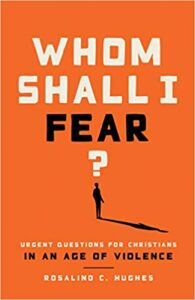 Whom Shall I Fear: Urgent Questions for Christians in an Age of Violence Rosalind C. Hughes (Upper Room Books) $13.99 OUR SALE PRICE = $11.19
Whom Shall I Fear: Urgent Questions for Christians in an Age of Violence Rosalind C. Hughes (Upper Room Books) $13.99 OUR SALE PRICE = $11.19
Wow, this looks like a great little book to reflect on in one’s devotional time of spiritual reading or to use as a guide for small group discussions. It is short (108 pages before the closing litany and an extensive group leader’s guide.) And it is written with a certain sort of reflective gentleness, it seems. Yet it is potent and provocative, creative, even.
Hughes is an Episcopal priest and rector of Church of the Epiphany in Euclid, Ohio. Her theology degree is from Oxford but she lives and works in a small town. Yet, even there, maybe especially there, folks are scared. This book and the fears it explores are not removed from the global economy and the threat of climate change or nuclear war, but, to be honest, it isn’t mostly about global peacemaking. It is more, it seems, inspired by our concerns about active shooters and the drills we have to have in many public places as we reasonably prepare to cope with attackers, ransom situations, SWAT teams and the like.
Even our houses of worship are not immune to violence so one of the questions we must have, a challenge for faith communities of all sorts, is how do we respond to the threat of potential violence within our neighborhoods and even our sacred spaces.
Reverend Hugh invites us to reflect on Biblical stories — the first about closed and locked doors — and ask hard questions about hospitality. She encourages us to “step back from fear” and examine our security politics in light of Scripture.
Okay, that’s putting our money where our mouth is, isn’t it? Living into that claim of Christ claiming “every square inch” of life. What do we do that is distinctively or uniquely Christian in our consideration of locked doors and armed security and gun violence, especially regarding our congregational settings?
In an age of school lockdowns, police brutality, and rising violent white supremacy, I want to know: Where is the church? Who is the church? How do we be the church in these challenging circumstances? Through story, scripture, and prayer, Rosalind Hughes invites us into personal and communal reflection on what it means to follow the nonviolent way of Jesus. — Lydia Wylie-Kellermann, author of The Sandbox Revolution: Raising Kids for a Just World
In a society that continues to arm itself at a fearful rate, the Rev. Rosalind Hughes helps us explore what it might mean to put on the armor of light. With exceptional scholarly and pastoral ability, she both challenges and emboldens us to a deeper self-examination through the lens of scripture and a pedagogy of humility and vulnerability. Whom Shall I Fear? is a timely gift to an uncertain church in an unstable world. — The Right Reverend Mark Hollingsworth, Bishop of the Episcopal Diocese of Ohio
BIBLICAL PEACEMAKING AND ANTI-WAR MINISTRY
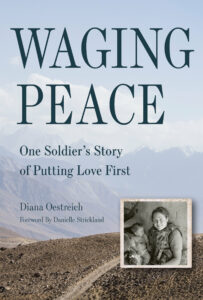 Waging Peace: One Soldier’s Story of Putting Love First Diana Oestreich (Broadleaf Books) $24.99 OUR SALE PRICE = $19.99
Waging Peace: One Soldier’s Story of Putting Love First Diana Oestreich (Broadleaf Books) $24.99 OUR SALE PRICE = $19.99
For those who like well written but clear and inspirational memoirs, Waging Peace is one of those books that you won’t be able to put down. I loved Diana’s description of patriotic enlistment in the US Army and her deployment to Iraq as a combat medic. Her faith sustains her through the hardships (including sexual harassment from her own fellow soldiers and officers) and while the story is dramatic, it isn’t sensationalized or horrific. I’ve read battle stories that are deeper and certainly more gruesome. But yet, this book kept me on the edge of my seat; it was harrowing as she told, in gripping storytelling, what is was like for her realizing she may have to kill children. I do not know why she didn’t think of that earlier — well, I sort of do, as I’ve counseled young men planning to enlist and it is amazing how slick military recruiting ads and video games distort the reality of what warriors may have to do. In any case, when Oestreich got there, proud of her country and loyal to her troops, committed to her battle buddies, she faced a crisis of conscience. As a Christian, could she do that?
As a medic Oestreich had some significant work to do, including helping Iraqi citizens, and the early chapters are exciting about her making her way into dangerous villages while not speaking the language, gaining the apparent blessing of one older matriarch whom she had to decide if she could trust or not. In these forays into the village, she gave the US presence there a somewhat better reputation among villagers. She helped the sick. She treated wounds, she saved lives of those who were battle wounded but more, the impoverished women and children in dusty Iraq villages. The woman who provided her safety and guided her, we learn, was Om Hassan. Oestreich credits Hassan for breaking something open in her; that this Iraqi woman would trust her, and that Oestreich had to make a decision to trust her — following her deep into the village of possible enemies, suicide bombers, even, who were trained to hate her (as she was trained to fear them, trained to kill them) — became a huge step towards a lived compassion that grew in her during these dangerous months in country.
As I re-read that portion and the credit she gives to this woman that showed a stranger hospitality so they could give and receive care, I, again, was dissolved to tears. This is a war story unlike any you have ever read.
The story unfolds and as she bears witness to danger and horror, as the stress continues and her companions bear the strain of war, she continues to wonder about the Sunday school lessons of her youth, the grace of the gospel, the love of God. She comes back to the episode with Om, her being befriended by an enemy, the tentative steps towards trust, a discovery of humanity that cried out to her soul. She had to come to grips with the huge question of whether God would want her to kill others who He so loved. She is faced with IEDs, fires, death and destruction. She sees kindness and goodness (on both sides) in that harsh landscape. She realizes she does not want to carry her weapon. As a medic she saw herself offering mercy to all, and made a huge move. You’ve got to read how she came to that move which she saw as a brave act of principle, of conscience, of freedom. She was heading down a path that would soon call into question not only the ethics of her deployment and that war, but of the very idea of killing for political reasons. She was becoming a war-time, battlefield conscientious objector. As the subtitle put it, she was going to “put love first.” It’s a complex and riveting story, morally complicated and theologically freighted. But she realizes it is her time to walk in the way of Jesus. She needs to wage peace.
After coming home she continued the story as she went to work with the extraordinary organization Preemptive Love that started doing pediatric health care in cross cultural ways in Middle Eastern war zones. Her bio reads that she is an activist, a veteran, a sexual assault nurse and the key relationship officer at Preemptive Love. She has her work cut out for her still as a peacemaker and justice advocate.
I wish I knew how to persuade you to use this book in your next book club, to read it and discuss it and share it. You may not agree with her choices; you may not find her simple faith and Biblical obedience sensible. No matter — this is a great story of a great faith journey, one you may never forget. If Jesus says peacemakers like her are “blessed” and “children of God” (Matthew 5:9) then it might be wise to read her testimony. Yes!
Please (please) read these endorsements who capture some of why this book is one we recommend:
Once in a while, we encounter a story so vivid, so personal, it drags us from complacency and propels us toward possibility. This is one of those rare books. Told through combat boots and teacups, mothers and neighbors, enemies and their absence, Waging Peace promises something more valuable than security and taking sides. Bold, tender, and courageous to the core, this book has changed my life forever. —- Shannan Martin, author of The Ministry of Ordinary Places and Falling Free
Love never fails. Oestreich’s Waging Peace invites us to believe those words as never before. The world is barricaded behind walls of shame and ‘otherizing,’ and only tender love can scale those walls. On the other side, we find our shared humanity, a reverence for complexity, and a longing to be practitioners of this dangerous hope that only chooses love. This book helps you scale the walls. —- Gregory J. Boyle, S.J., author ofTattoos on the Heart: The Power of Boundless Compassion and The Whole Language: The Power of Extravagant Tenderness
Diana Oestreich’s personal transformation is laid out like bread crumbs for readers to follow without having to participate in military conflict. Diana shows us that the ultimate act of peace is to love. This book is a confession, an atonement, and an act of penance. If one soldier can emerge from such trials, then there is hope for us all to conquer fear. At the same time, it is an instructional manual on how humans can be more humane regardless of circumstance. —- Garett Reppenhagen, US Army Iraq veteran, and Executive Director of Veterans for Peace
In faith pursuits, the simplest commitments always get closer to the heart of things. That’s what I found in Diana’s Waging Peace. Summed up with clarity rising from living into truth, not just talking about it, she offers this message: “Love first. Love always. Neighbors and enemies. It’s possible, even in life’s most challenging moments.” Diana’s story could not be more relevant and needed, here and now, where fear and division find constant justification to see even our neighbors as enemies. This book inspires. I feel a resonant sense of gratitude for this voice at this time. —- John Paul Lederach, professor emeritus, University of Notre Dame, author of The Moral Imagination: The Art and Soul of Building Peace and Reconcile: Conflict Transformation for Ordinary Christians
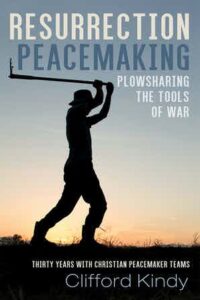 Resurrection Peacemaking: Plowsharing the Tools of War: Thirty Years with the Christian Peacemaker Teams Clifford Kindy (Resource Publications) $19.00 OUR SALE PRICE = $15.20
Resurrection Peacemaking: Plowsharing the Tools of War: Thirty Years with the Christian Peacemaker Teams Clifford Kindy (Resource Publications) $19.00 OUR SALE PRICE = $15.20
Decades ago some bold leaders speaking out against war pushed some who were writing and speaking and protesting against war to do more, to do what some not-so-well-intended critics said we should: if we love our enemies so much, why don’t we go there? Indeed, if we were dreaming up idealistic alternatives to war (and learning what brave others have done down through the ages) why not try to publicly protest and bear witness in a real war zone? Brethren and Mennonite and Quaker pacifists were in the leadership of these sorts of plans; in our circles, this included Ron Sider and friends at Sojourners magazine (who had just published a book published by Harper that featured a small chapter about a Pittsburgh peace group I was involved with.)
Would any of us put our money where our mouth was, so to speak? More properly understood, would any of us take Christ’s mandate to be a peacemaker seriously enough to enter this controversial and dangerous work, pay up with our lives if necessary. A few folks we knew and one we loved very much headed off after some intense training in nonviolence to the Middle East and to Central America where, as the mid-80s Bruce Cockburn sung, down “Where the Death Squads Live.” In those years this iteration of this movement to put US prayer warriors in between the US backed death-squad contras and the innocent villagers they targeted was known as Witness for Peace which soon enough became (or merged with) Christian Peacemaker Teams (CPT.) Kathy Kern’s 600-page work In Harm’s Way: A History of Christian Peacemaker Teams is the definite history and study of this, linking the formation to a speech Ron Sider gave in 1984 to the Mennonite World Conference in Strasbourg, France.
For those who follow this work, the name Clifford Kindy is legendary. He was an early leader, went on many Christian Peacemaker Teams, offered encouraging assistance to many more. The hard work of this kind of peace-building is obviously strengthened by working in community and forming collaborative teams and here he tells us the stories of how some of these peace-witnessing mission-type trips developed, what happened, the impact they did or didn’t have. Kindy draws the reader through the danger, drama, and spirituality of these trips but he also (as he puts it) shares the “mediocrity” of his personal experience, including his life at his farm in Indiana. Well, there’s nothing mediocre about any of this, really, although some may be what we might call mundane. There’s a lot of day by day practical work to prepare to head to, oh, say, The Congo or Palestine or Baghdad. There’s some spiritual preparation to be done when one knows one might be detained, arrested, tortured, and might die. Yeah, there’s that.
Some of the chapter titles are so fascinating they make you want to skip ahead just to see what he’s writing about. It’s fairly plain-spoken, but, good golly, you’ve got to read “In Boko Haram’s Wake”, “Fear and I in Nigeria”, and “Baghdad – Living in the Bullseye.” The one about the suicide bomber that visits a CPT is stunning. “Wild Columbian Bulls” is certainly interesting. There’s a chapter about how they trained a nonviolent team of devout Muslims, showing the interfaith possibilities of this project. One of the chapters is about their ongoing public witness against the depleted uranium (from nuclear weapons) campaign in Tennessee.
As Clifford explains in the preface, Resurrection Peacemaking begins with the drama of Israeli occupation in Gaza and chapter two flies us back to Joyfield Farm in Indiana, showing what life is like at home for this CPTer.
I know that some BookNotes readers will recognize the name Chad Meyers. He is most known for his amazingly fresh, thorough, political reading of the gospel of Mark called Binding the Strong Man. We stock his other books, including the recent Healing Haunted Histories: A Settler Discipleship of Decolonization.
Here is what he and his wife wrote about meeting Cliff Kindy:
When we met Cliff Kindy and family at their Joyfield Farm during a Christian Peacemaker Team Congress in 1998, they already embodied an exemplary personal and political discipleship of nonviolence. This now revered elder peacemaker chronicles how CPT experiments around the world are opening paths that can liberate us from our captivity to militarism. Both harrowing and inspiring, Kindy’s stories and analysis invite us into, and instruct us in, that crucial work. –Ched Myers and Elaine Enns, co-authors of Healing Haunted Histories: A Settler Discipleship of Decolonization
Rose Marie Berger is a seasoned and well-traveled peacemaker and top notch reporter. She has sen it all, and puts well just what we think of this:
Kindy is a Midwestern farmer who eschews swords and is familiar with plowshares. In that Isaiah tradition, he offers gripping stories of courage, sacrifice, and faithful Christian witness in situations of intractable and deadly violence. Nonviolence is most effective, writes Kindy, when it intentionally retakes the initiative from the actors of violence. From Gaza to Iraq, Nigeria to Colombia, and back to the United States, Kindy reveals a hidden truth behind the Christian Peacemaker Team, a civilian “nonviolent special ops,” who for more than thirty years have been infiltrating war zones to de-escalate violence, accompany peacemakers, and serve the victims of war — all for the sake of Jesus. These are the stories of our unsung peace heroes. Remember them. Honor them. Emulate them. — Rose Marie Berger, senior editor at Sojourners magazine
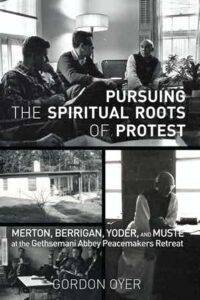 Pursuing The Spiritual Roots of Protest: Merton, Berrigan, Yoder, and Muste at the Gethsemani Abbey Peacemakers Retreat Gordon Oyer (Cascade Books) $33.00 OUR SALE PRICE = $26.40
Pursuing The Spiritual Roots of Protest: Merton, Berrigan, Yoder, and Muste at the Gethsemani Abbey Peacemakers Retreat Gordon Oyer (Cascade Books) $33.00 OUR SALE PRICE = $26.40
What a book! This is fascinating, detailed, a detective story and investigative report, history told about an event many have heard of and yet no one has heretofore seriously explored. For serious fans and students of Thomas Merton, they know of his pulling together a gathering of a handful of Protestant and Catholic thinkers and activists to talk about the spiritual roots of protesting war. One or two mentions may be made of this momentous retreat that was held in fall of 1964 — Martin Luther King had intended to quietly attend but had to go to Norway to give his acceptance speech for the 1964 Nobel Peace Prize. In his place his friend and nonviolent teacher Bayard Rustin was going to be there, but decided at the last minute to go with King to Oslo.
This unfolds slowly, but for those interested in the inter-relationships and networks that shaped the religious left and Christian peacemaking in the 1960s, it is thrilling. Dorothy Day was considered, of course, but women were not allowed at the Cistercian monastery in those years. The Catholic Peace Fellowship was struggling and a young Mennonite scholar John Howard Yoder was becoming one of the first Mennonite peace teachers to become known in the wider ecumenical world. That both Berrigan brothers were there is no surprise (Dan had already become friends with Merton) but the politics of superiors and church officials made some of this tricky, to say the least.
A.J. Muste was a legendary Quaker pacifist, by then getting up in years. Merton really wanted to meet him, but, as a rather older sectarian, he wasn’t quite aware of who the famous monk was, let alone how influential he was becoming. (When his order silenced him from writing, he sent articles under a nom de plume to Dorothy at The Catholic Work that caught the attention of the Vatican. Merton continued to be outspoken about the abolition of war and the dangers of nuclear weapons. As Merton friend and biography Jim Forest writes in the fabulous preface of Pursuing the Spiritual Roots of Protest, “many essays about peacemaking followed as a book, Peace in the Post-Christian Era, but its publication had been stopped by the head of the Trappist order in Rome, Dom Gabriel Sorais, who felt that it was inappropriate for a monk to write on such controversial topics.”)
Who pulled this event together and why? How did the Pittsburgh meeting of Presbyterian clergy studying peacemaking related? The late Jim Forest (who died just a few weeks ago) was obviously central. It was postponed several times over a year — schedules didn’t mesh, Merton was depressed and overworked, Berrigan was in jail, etcetera. What a time it was as the Viet Nam war was rumbling, the historic civil rights nonviolent protests were being debated, Merton was nearly a celebrity, and, well, the Berrigans. It was years before they would be on the cover of Time for burning draft files in Catonsville, years before Nixon had them arrested where the Harrisburg trials were a fiasco, and Paul Simon sang about the”radical priests” in “Me and Julio Down by the Schoolyard.” But for those who want a glimpse into what deep spiritual lessons were presented and vigorously discussed in this invitation-only, off-the-books retreat, Gordon Oyer has done us a great service.
Pursuing the Spiritual Roots of Protest was a labor of love with detailed study of archives, letters, interviews, with Oyer tracking down over years of research the slimmest possibility of somebody who had heard something first had. Most of the participants had long died, but he did interview some who were there (Jim Forest, for instance) and had fairly extended notes from the Yoder archives at Notre Dame. There are a couple of pictures. This event, I am convinced, is a major historical occurrence in the second half of the 20th century. Serious historians of the 60s peace movement have long wished for more information about it. Merton aficionados have always wondered. That Oyer has given us this detailed, definitive account, drawn from copious notes and letters and conversations and journals, is extraordinary and a great, great, gift.
A very curious thing that I did not know: Merton had advanced manuscripts of a book called The Technological Society by a Frenchman named Jacque Ellul that was being translated by W.H. Ferry, who pirated apparently unedited copy to Merton the week before the November retreat. Merton was very impressed by this Ellul manuscript and held forth about it in his sessions at the Gethsemani retreat. Who knew?
 Disarmed: The Radical Life and Legacy of Michael “MJ” Sharp Marshall V. King (Herald Press) $17.99 OUR SALE PRICE = $14.39
Disarmed: The Radical Life and Legacy of Michael “MJ” Sharp Marshall V. King (Herald Press) $17.99 OUR SALE PRICE = $14.39
This is a moving story of a peace hero many have not heard of. MJ traveled the world unarmed urging soldiers to choose peace. He was kidnapped and killed on a UN mission in the Democratic Republic of Congo. Famous peace-building scholar John Paul Lederach has a moving foreword; award winning historical and great writer Adam Hochschild (who wrote King’s Leopold’s Ghost about colonial Africa) says Disarmed “reminds us of a kind of courage that is all too rare in this world.”
Here is how the publisher describes it Michael and his life and death:
Michael “MJ” Sharp was a modern Mennonite armed with wit and intellect, but not a gun. The son of a Mennonite pastor, he demonstrated a gift for listening and persuading early in life. His efforts to approach others with acknowledgement rather than judgement gave him the ability to connect on a level very few managed. He also honed a deep commitment to peace, and after college he joined the Mennonite Mission Network and moved to Germany, where he persuaded soldiers to choose peace and free them of their violent systems.
At 34 years old, MJ was working for the United Nations Group of Experts in the Democratic Republic of the Congo—urging rebels to lay down their weapons—when he was murdered, likely assassinated alongside his colleague Zaida Catalán by those with government ties. This compelling account of MJ’s life, death, and legacy from longtime journalist Marshall V. King explores what compelled Sharp to travel the world working for peace and the ongoing impact of his life and death in the ongoing story of Christian peacemaking in a war-torn world.
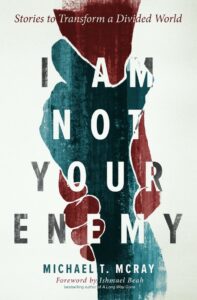 I Am Not Your Enemy: Stories to Transform a Divided World Michael T. McRay (Herald Press) $16.99 OUR SALE PRICE = $13.59
I Am Not Your Enemy: Stories to Transform a Divided World Michael T. McRay (Herald Press) $16.99 OUR SALE PRICE = $13.59
If Disarmed is a moving story of a quixotic Christian lead to serve as peacemaker in war zones, I Am Not Your Enemy is packed full of such stories. The foreword by award winning writer Ishmael Beah (who wrote A Long Way Gone about child soldiers) indicates that this is cutting edge stuff, vivid and real. Yes, there are violent stories that surround us, but don’t we need better stories, showing that, yes, sometimes good does triumph over evil? In this time of heightened alienation and fear, the back cover assures us, “McRay offers true, sacred stories of reconciliation and justice, asking what they can teach us about our own divided states.” Born out of the conviction that such stories can cultivate empathy (and perhaps even transform our fear) McRay— a professional storyteller, facilitator and practitioner of this kind of deep sharing —here reports back from the raw edges of real reconciliation.
In You Are Not My Enemy you will read about his interviews with peace builders, former combatants, pastors, even, who took up the causes of making the world a better place. He hears from “grieving parents who comfort each other across enemy lines, a woman who meets her father’s killer, and a man who uses theatre to counter the oppression of his people.” No wonder Becca Stevens, founder of Thistle Farms (and author of the brand new Practically Divine says it is “stunning.”
Poet, contemplative and Northern Ireland peace worker Padraig O’Tuama writes,
This book is a muscle, an ache, a practice of asking the troubling questions at the heart of peace.
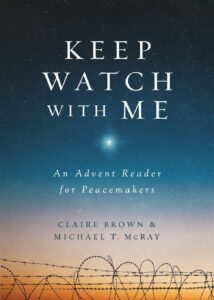 Keep Watch With Me: An Advent Reader for Peacemakers Claire Brown & Michael T. McRay (Abingdon Press) $16.99 OUR SALE PRICE = $13.59
Keep Watch With Me: An Advent Reader for Peacemakers Claire Brown & Michael T. McRay (Abingdon Press) $16.99 OUR SALE PRICE = $13.59
I wanted to list this now, even though it is a seasonal Advent book. It seems to me it is nearly always Advent, living in the dark as we do, waiting for the light of Christ’s Kingdom to come. This great little reader has a month’s worth of devotional readings, each by and about a particular peacemaker, social change activist, an inspiring person working with individuals who are incarcerated, victims of crime, refugees, trafficked. It shows how the radical call to join God’s movement and find Christ’s peace can be transforming for those who have been hurt, and those who are hurtful. This is a great little devotional for peacemakers of all sorts.
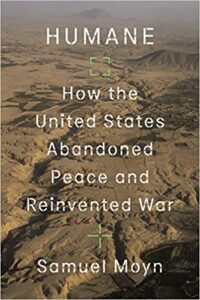 Humane: How the United States Abandoned Peace and Reinvented War Samuel Moyn (FSG) $30.00 OUR SALE PRICE = $24.00
Humane: How the United States Abandoned Peace and Reinvented War Samuel Moyn (FSG) $30.00 OUR SALE PRICE = $24.00
This is a thick and demanding book of groundbreaking investigative reporting and analysis, a thrilling survey of the implications and consequences of new ways we have come to think about warfare. I am not finished with this and I am not sure what to think — it is cunning and insightful and surprising, a truly new take on a vexing old problem.
Here is the gist: we have heretofore generally thought — at least those with moral scruples and ethical principles — that war is bad and that the tragic collateral damage of death and destruction of civilians and social infrastructure should be avoided, almost at all costs. We did not actually fight this way (in fact, quite the opposition) but we had some sort of sense that we, the USA, was not as barbaric as some in our strategies and policies. Prophetic voices against the empires often had to (at least in free democracies like our own where we could) speak up to hold the war-making State to account, insisting that, at least, they not target civilians, hospitals, dams, water treatment plants, schools. We have not always fought according to the just war theory but as ethical pundits and morally responsible Pentagon leaders pushed for constraints on the horror of war, it does seem that there has been some improvement, if we can call it that. Lefty cynics may not agree, but it does seem we have a more just and principled sort of modus operandi in our approach to war-fighting these days.
Our best moral guides, it seems, have shifted seeing war as a bad thing that should be abolished to a legitimate form of foreign policy to be moderated and reformed; not a necessary evil, but a necessary, if unpleasant, good, and thereby, perhaps a virtue.
And this, our intrepid author Samuel Moyn suggests, is why we have — in my words, not his — let our guard down, came to be less outraged by warfare, have grown complacent and complicit as citizens in what remains a death-dealing, horrible, cruel reality on the ground. As we have reinvented a way to do war in less gruesome ways, or at least have marketed it as such, we have come to think it maybe is not so bad.
Among many other plots and subplots, Humane includes a history of how an international effort to outlaw war gave way to an effort to regulate it, thereby giving the illusion that it was controlled, softer, humane, even. And law abiding; legitimate.
Here is how Andrew Bacevich, a former Marine and now President of the Quincy Institute for Responsible Statecraft, put it:
In this profound and deeply disturbing book, Samuel Moyn shows how efforts to curb war’s brutality — to make it more humane — finds the United States today caught in a bind where war has become perpetual. As technology further dehumanizes war’s conduct, this bind will become increasingly difficult to escape. — Andrew Bacevich, author of After the Apocalypse: America’s Role in a World Transformed
In gripping prose, one of our boldest intellectuals and most trenchant critics upends the conventional stories that are told about law, progress, and war. Humane exposes the deceptive promise of humanization and its role in supporting the clinically legalized wars of our future. This book is a call for moral and political engagement that should be very widely read. — Naz Khatoon Modirzadeh, founding director of the Harvard Law School Program on International Law and Armed Conflict
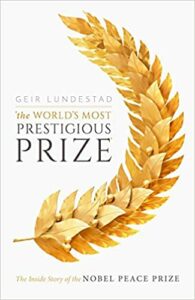 The World’s Most Prestigious Prize: The Inside Story of the Nobel Peace Prize Geir Lundestad (Oxford University Press) $24.95 OUR SALE PRICE = $19.96
The World’s Most Prestigious Prize: The Inside Story of the Nobel Peace Prize Geir Lundestad (Oxford University Press) $24.95 OUR SALE PRICE = $19.96
Happy to list this one, too, for those interested in the fascinating (and, admittedly, controversial) story of how the inventor of dynamite attempted to atone for the violence he helped bring into the world and, more, how the ongoing prize committee did or did not live up to the founder’s vision.
Geir Lundestad is a distinguished historian, himself, but, more importantly, he served for twenty-five ears as the executive director of the Norwegian Nobel Institute.
As University of Virginia professor of history Melvyn Leffler tells us, this unique volume, a history of the prize, adds “fascinating vignettes of his interactions with the winners — Mikhail Gorbachev and Barrack Obama, among others — with incisive reflections of a mature scholar of international relations.” How fascinating to review these laureates and see why they were named a winner of “the world’s most prestigious prize”and a bit of the backstory.
BRINGING IT HOME
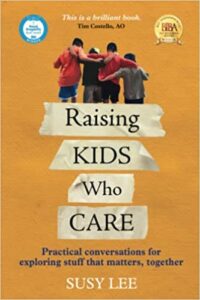 Raising Kids Who Care: Practical Conversations for Exploring Stuff that Matters, Together Susy Lee (598 Press) $19.99 OUR SALE PRICE = $15.99
Raising Kids Who Care: Practical Conversations for Exploring Stuff that Matters, Together Susy Lee (598 Press) $19.99 OUR SALE PRICE = $15.99
This recent book is said to be an encouragement and resource for parents who want to help their kids build relationships, counter outside influences, grow strong character, and contribute with purpose to world issues. That’s putting it mildly! This is a vibrant and thoughtful book inviting us to help our kids care about the world as God does. The author delights in saying that this is her passion for the Kingdom of God even if the book isn’t necessarily written for an exclusively religious audience. Nice! Besides plenty of stories and good insight, it actually contains forty guided conversations for families to help teach good communication. Which is, of course, a key tool for effective flourishing for any child, but, especially, for those who want to be purposeful about peacemaking.
Ms Lee says this warm but thoughtful parenting book actually “comes out of my Master’s Degree in Peace and Conflict Studies. I really believe prevention is better than cure, so if we can raise kids who know how to listen and converse, who value empathy and relationship, and who want to contribute to the world with purpose, then we will be peacemakers!!
As she told me: “I can summarize my whole degree like this: communication is the best tool we have for conflict resolution. It’s a skill though that we too often assume rather than teach. The conversations in my book are designed to teach these skills!
Listen to this good endorsement by missional thinker, Micael Frost:
Not content to let Instagram and Netflix raise our children, Susy Lee has written a brilliant guidebook that helps kids to put down their screens and dive into deep family conversations about critical social issues. If you want your family to care more about others, social justice, the planet, and culture in general, use this book! It’s fun, practical, inspiring, and it might just change the world! — Michael Frost, Morling College, Sydney and author of Surprise the World: The Five Habits of Highly Missional People
This is a brilliant book. I just wish it had been around when my own children were younger! It is a treasure trove of insight, information and inspiration; with excellent questions and ideas for deepening the conversations in families, helping them to become rich places for the exploration of deep values and character formation. Every parent needs it in hand. — Tim Costello former CEO and Chief Advocate, World Vision Australia
This remarkable book is about hope that change is possible. As a caring parent, an inspiring practitioner with a deep sense of social justice, and a brilliant peace scholar, the author invites us on the journey of nurturing hope in the world, one family at a time. I cannot wait to delve into each of the 40 family conversations in this book with my family. — Dr Dong Jin Kim, Senior Research Fellow in Peace and Reconciliation Studies, Trinity College, Dublin
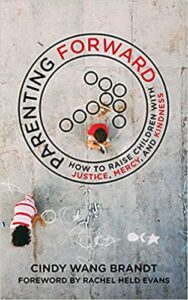 Justice, Mercy, and Kindness Cindy Wang Brandt (Eerdmans) $17.99 OUR SALE PRICE = $14.39
Justice, Mercy, and Kindness Cindy Wang Brandt (Eerdmans) $17.99 OUR SALE PRICE = $14.39
I pitched this at our BookNote blog when it first came out in 2019. I said, of course, that it is rare sort of book, solidly Christian but not beholden to the religious right. Not like you’d read from most evangelical publishers, something different from Focus on the Family. I am sure I noted that Rachel Held Evans wrote the forward, a good forward. Little did we know then in the winter of that year that she would die unexpectedly that Spring at age 37, leaving her husband with two young children. I have re-read her good preface and just wanted to give this book another shout out, fitting in to this theme as it does, even though it isn’t brand new.
Here is what the publisher invites us to realize about this book:
How do we build a better world? One key way, says Cindy Wang Brandt, is by learning to raise our children with justice, mercy, and kindness.
In Parenting Forward Brandt equips Christian parents to model a way of following Jesus that has an outward focus, putting priority on loving others, avoiding judgment, and helping those in need. She shows how parents must work on dismantling their own racial, cultural, gender, economic, and religious biases in order to avoid passing them on to their children.
“By becoming aware of the complex ways we participate in systems of inequality or hierarchy,” she says, “we begin to resist systemic injustice ourselves, empower our children, and change our communities.”
As Carol Howard Merritt, author of Healing Spiritual Wounds, observes:
Cindy Wang Brandt shows us how to respect children, nurture creativity, and encourage their flourishing. Wisdom shines through on every page.
 The Sandbox Revolution: Raising Kids for a Just World edited by Lydia Wylie-Kellermann (Broadleaf) $17.99 OUR SALE PRICE = $14.39
The Sandbox Revolution: Raising Kids for a Just World edited by Lydia Wylie-Kellermann (Broadleaf) $17.99 OUR SALE PRICE = $14.39
I wrote about this back in December, and that was long overdue — it’s a fascinating book, potent and probably unlike any you’ve seen. I’d like to reprise those comments in slightly edited form here
The Sandbox Revolution is a report from seriously radical, faith-based social activist and peacemaker about how they’ve raised their kids consistent with their lifestyles and visions and convictions that often put them at odds with the mainstream values of their friends, families, and neighbors, and, often, their church families. I suppose some of our good customers aren’t going to see themselves as part of this energetic movement of public theology and social resistance. But for those who want some important conversations that you might not get in your own family or church, this could be stretching and helpful.
Endorsements on the back are weighty, from Liz Theoharis (co-chair of the Poor People’s Campaign), Cindy Wang Brandt (who wrote the very nice Parenting Forword: How to Raise Children with Justice, Mercy, and Kindness) and the wise Quaker, Parker Palmer.
Lydia Wylie-Kellerman was raised in a family of deeply Christian, radical discipleship. Her parents wrote for Sojourners at what might be considered the height of their agitating, doing civil disobedience, and leading local campaigns of fighting the principalities and powers in nonviolent and transformative ways. I am glad that Lydia emerged from that with faith and new creation visions intact; some kids of parents of those movements have scars and resentments that their parents conscripted them to such activism.
Wylie-Kellermann is a good writer like her parents, and she is the editor of Geez magazine. She has curated the Radical Discipleship blog and writes for various Catholic Worker papers.
The Sandbox Revolution is a collection of inviting stories for parents who want to raise children to work for justice and who see their parenting as part of their whole-life spiritually based activism. You will find here pieces by folks of various Christian faith traditions, interviews and conversations with people in different places within the broader networks of social change projects. Some are scholars (Laurel Dykstra) and some are long-standing faith leaders (Dee Dee Risher) and some are themselves from legendary anti-war families (Frida Berrigan.) Some of the contributors you may know from recent books such as Jennifer Harvey (on anti-racism work among white parents) and Randy Woodley bringing his Native insights.
Lydia is a good writer, an imaginative organizer, and here she has brought together a remarkable collection for those wanting to ponder and learn about parenting for peace and justice. This is a book to inspire you to think well about raising children as peacemakers and more. We are very glad to suggest it here.
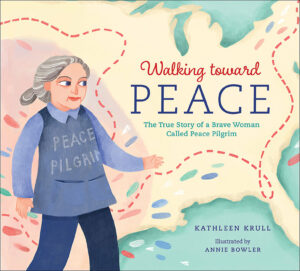 Walking Toward Peace: The True Story of a Brave Woman Called Peace Pilgrim Kathleen Krull, illustrated by Annie Bowler (Flyaway Books) $18.00 OUR SALE PRICE = $14.40
Walking Toward Peace: The True Story of a Brave Woman Called Peace Pilgrim Kathleen Krull, illustrated by Annie Bowler (Flyaway Books) $18.00 OUR SALE PRICE = $14.40
This is the story of a woman who gave up everything she owned, even her given name, and, in a quirky call worthy of an Old Testament prophet, set off to walk across the country in the wake of World War II, raising a kind and gentle anti-war message. We met Peace Pilgrim before her untimely death in 1981 at the age of 74. This is a fascinating children’s picture book by an award winning author and a creative rising artist.
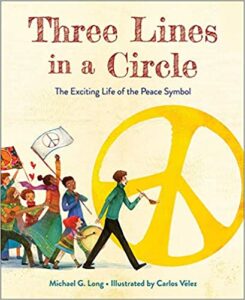 Three Lines in a Circle: The Exciting Life of the Peace Symbol Michael G. Long, illustrated by Carlos Velez (Flyaway Books) $18.00 OUR SALE PRICE = $14.40
Three Lines in a Circle: The Exciting Life of the Peace Symbol Michael G. Long, illustrated by Carlos Velez (Flyaway Books) $18.00 OUR SALE PRICE = $14.40
Wow, who would imagine that the history of the peace symbol could be so energetically told and vividly presented? And that it could be so interesting and, yes, inspiring, if you want your children to conspire for what black leaders sometimes call “good trouble.” This really is a fabulous, colorful book.
You may find it interesting who first thought up the famous sign — it was in 1958 and has something to do with semaphor the letters n and d.
Mike Long, by the way, is an ordained minister friend, a historian and professor (near us in Central Pennsylvania at Elizabethtown College.) He has written very well-respected biographies of people who have made a difference, from Bayard Rustin to Jackie Robinson, to an excellent, serious volume on Mister Rogers. He has done thorough research on nonviolent peace actions and now he’s done a biography of a symbol. What fun. Carlos Velez has illustrated more than twenty books for children and is widely recognized with illustration awards. He lives in Mexico City.
Take a sneak preview here.
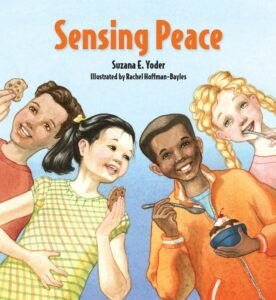 Sensing Peace Suzana E. Yoder, illustrated by Rachel Hoffman-Bayle (Herald Press) $13.99 OUR SALE PRICE = $11.19
Sensing Peace Suzana E. Yoder, illustrated by Rachel Hoffman-Bayle (Herald Press) $13.99 OUR SALE PRICE = $11.19
We’ve promoted this book at events and conferences for years, and thought it would be fun to include it here. It isn’t as Christ-centered as I might wish, it is a lovely work that could be used in public schools or in various settings. It does invite children to be peace. It shows scenes of people doing service and showing understanding among differences. It is sweet without being simplistic, and I think it is a wise step toward taking up that peace sign, above.
Sensing Peace, though, has another feature that makes it particularly interesting: it invites children to sense peace by using their senses. It asks them to see and taste to be attentive to their embodiedness (although it doesn’t use that big word.) It is delightful book that encourages an awareness of listening and looking, touching and feeling. They can experience peace!
Susan Yoder grew up in a fairly small town, Mennonite setting and now teachers in an urban school and has a heart for children in her city. Hoffman-Bayle was raised in Utah and now lives in New York.
+++
TO PLACE AN ORDER
PLEASE READ THESE SIMPLE REMINDERS AND THEN CLICK ON THE “ORDER” LINK BELOW.
It is helpful if you would tell us how you prefer us to ship your orders. The weight and destination of your package varies but you can use this as a thumbnail, general guide.
There are generally two kinds of US Mail options, and, of course, UPS. If necessary, we can do overnight and other expedited methods, too. Just ask.
- United States Postal Service has the option called “Media Mail” which is cheapest but slow and may be delayed. For one book, usually, it’s about $3.50 – $4.00
- United States Postal Service has another option called “Priority Mail” which is about $8.35 if it fits in a flat rate envelope. Many children’s books are oversized so that will take the next size up with is $8.95. That gets much more attention than does “Media Mail.”
- UPS Ground is reliable but varies by weight and distance and may take longer than USPS. We’re happy to figure out your options for you once we know what you want.
– DON’T FORGET TO LET US KNOW WHAT SHIPPING METHOD YOU PREFER –
HELPFUL HINT: If you want US Mail, please say which sort — Media Mail or Priority Mail — so we know how to serve you best. If you say USPS or “regular” we’re left scratching our noggins.
BookNotes
SPECIAL
DISCOUNT
20% OFF
ALL BOOKS MENTIONED
+++
order here
this takes you to the secure Hearts & Minds order form page
just tell us what you want to order
inquire here
if you have questions or need more information
just ask us what you want to know
Hearts & Minds 234 East Main Street Dallastown PA 17313
read@heartsandmindsbooks.com
717-246-3333
We are still closed for in-store browsing due to our commitment to public health and the common good (not to mention the safety of our staff and customers.) The vaccination rate here in York County is sadly lower than average and the hospitals are overcrowded. Our store is a bit cramped without top-notch ventilation so we are trying to be wise and faithful. Please, wherever you are, do your best to stop this awful sickness going around.
We are doing our famous curb-side customer service and can show any number of items to you if you call us from our back parking lot. We are eager to serve and grateful for your patience as we all work to mitigate the pandemic.
Of course, we’re happy to ship books anywhere. Just tell us how you want them sent.
We are here 10:00 – 6:00 EST / Monday – Saturday, closed on Sunday.

